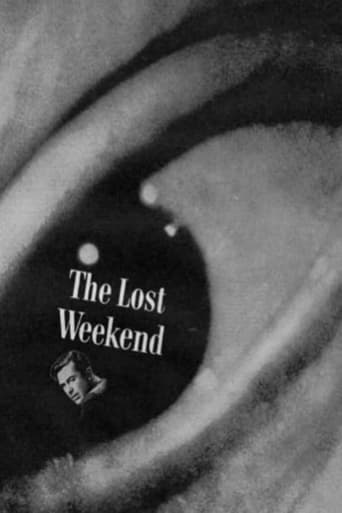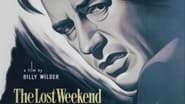Pjtaylor-96-138044
'The Lost Weekend (1941)' wraps itself up a little too quickly to be entirely convincing, though the promises made in the finale could be just as empty as those made in the opening (making the ending much darker than it appears to be), and there is the occasional lull in pace marked by a repetition indicative of the alcoholism of the protagonist, but it's a daring and generally powerful cry against addiction in all its forms compounded by some excellent writing and performances (especially the Oscar-winning turn from Ray Milland) that really get into the psychology of the characters. 7/10
framptonhollis
Despite its age, message, and subject matter, "The Lost Weekend" never delves into cheesy, laughable PSA territory and, instead, contains a most impressive and powerful sense of realism. As a matter of fact, it doesn't feel like this film has aged a day since its 1945 release; it was a genuinely powerful film then, and is a genuinely powerful film now!I have heard some people label this film as "silly" and "dated", but I simply cannot understand these claims. "Reefer Madness" is certainly ridiculous, filled with obvious propaganda and straight up lies; but no lies are to be found in this earth shatteringly strong tale of a man's tragic downfall (although it does have a hopeful ending, which is executed in a way that it doesn't feel at all forced or unrealistic). While Billy Wilder is most known for his comedies, he was also a master of drama in his earlier career. Films like "Double Indemnity" and "Sunset Blvd" are two films that are primarily dramatic (although "Sunset Blvd" does have its darkly hilarious moments throughout, which makes me consider it to be a drama first and a black comedy second), but are also among Wilder's most well known. With "The Lost Weekend", Wilder may have crafted his darkest film. It is a story of addiction that is told nearly as powerfully as the infamously shocking and graphic masterpiece "Requiem for a Dream". However, this film is even better, for it managed to get that same impact while having been made years upon years ago; a time when some might say that cinema hadn't fully "matured", at least not mainstream Hollywood).I must also note the brilliance of this film on a technical level. For the most part, the performances are somewhat standard, 40's performances, but Ray Milland is different. His performance is still smashingly powerful today and he is able to showcase this downfall with perfection. It is also wonderfully directed and shot. Wilder's lens turns this classic tragedy into a film noir, with sharp, black and white cinematography and an ever-present sense of doom. I was also impressed at how Wilder lets visuals tell the story a lot of the time, rather than words; which provides me with yet another example of how ahead of its time this film truly is. And, last but certainly not least, the score by Miklós Rózsa is indescribably brilliant. The soundtrack flat out adds another layer of horror and emotion. A quality film on every level, "The Lost Weekend" manages to remain strong and realistic today; never seeming silly or dated.
calvinnme
... and not get tired of it. Ray Milland's performance is riveting and, if you are watching for the first time, the first scene will do nothing but raise questions, getting you involved. How did Don (Ray Milland) get to be such an alcoholic? Why does his brother have a right to say how he lives? What does he do for a living? Why does such a seemingly together woman like Helen (Jane Wyman) stay with this guy for three years? All of these questions get answered slowly as the movie unravels over one long weekend that Don was supposed to spend in the country with his brother, but instead spends alone, but thanks to ten dollars that Don's brother left behind, he does not spend it completely alone - he's got money to buy booze.And yet Don doesn't plan ahead. He thinks enough to cover up the two bottles he buys at the liquor store with some apples that he buys to put up on top of the bag as he walks home so neighbors cannot see the booze, but the urgency doesn't come until he is completely out of liquor and out of the ten bucks to get more. And he is willing to do ANYTHING to get that liquor - he'll pretend to be interested in a girl in a local bar who is obviously crazy about him in order to get a few bucks, he tries to trade his typewriter (he's a failed writer) to a local bar owner for a drink, he steals money from a woman's purse in a nightclub to get booze, he even stages a faux hold-up (he has no gun) to get a bottle from a liquor store.And that's it for the entire movie - Don Birnham and his quest for the next bottle eats all of his time and energy. Other characters are just instruments in that quest or are in the form of flashbacks to tell you how Don got to where he was in the first scene. And then there's that haunting score that runs the length of the film. Everything is brutal realism UNTIL the last scene. Maybe it was the censors, but today it could have cost the film some Oscars.A couple of questions never raised. How did Don's brother Wick manage to support himself AND Don all of these years IN New York City? Didn't Wick ever long for a life and family of his own? There's got to be a limit to anybody's patience and charity, even if they are kin. Another question from an old film buff like me - Isn't it odd how the Great Depression and World War II magically disappear from sight in the past that Don is recollecting. 15 years of American history that effected everybody seems to have no place in Don's story. To look at this film, this shiny bustling post-war world has always been there. This is the turn of film from Depression and world war - collective struggles - back to the struggle of the individual with himself, the beginning of noir.
Ross622
For alcoholics there is a lot of lessons to be learned in the film that earned Billy Wilder his first academy award for best director The Lost Weekend. Though not really a film that deserved to win best picture this movie knows a lot about alcoholism and how addicting it could be when people didn't know the effects at the time of it's release. The movie stars Ray Milland as Don Birnam an alcoholic writer who binges on alcohol for exactly 3 days straight, (as well as deserving his Oscar for proving the bad effects.). Though not a great film it also tells us how crazy a drunkard can really be. It's Milland who gives a better performance than anyone else in this film but the Jane Wyman performance is a little tiny problem with it, which that was in the ending scene when Birnam wants to kill himself but Wyman's character does one good thing and that is persuade him not to kill himself but the biggest mistake is that SHE TRIES TO MAKE HIS ALCOHOL ADDICTION A LOT WORSE THAN IT WAS BEFORE. Wilder does a decent job with directing this film, but one thing just leaves me with one question, Why did this film get so much Oscars including best picture that it didn't deserve?










